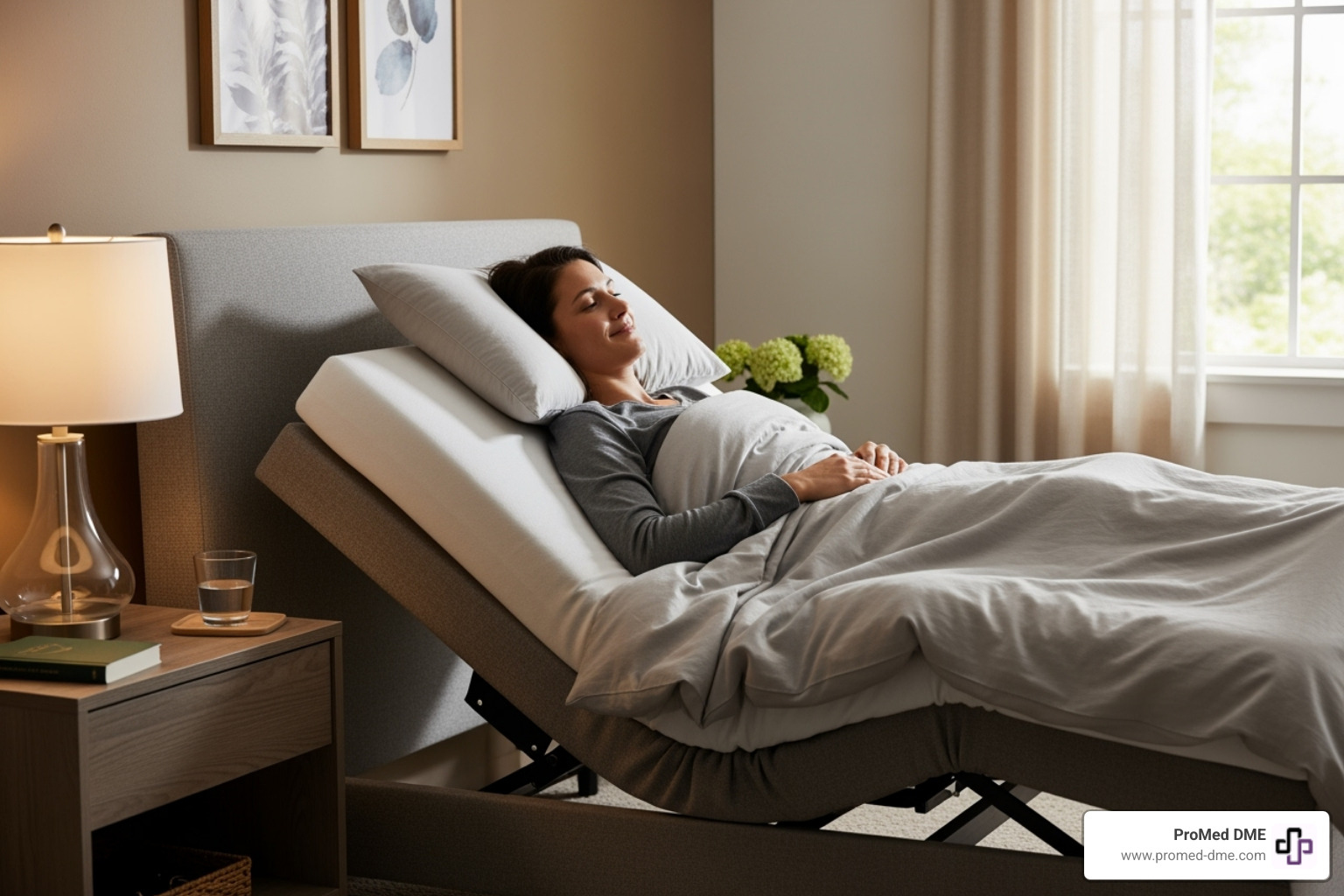Getting Paid: A Guide to Medicare's DME Reimbursement

Medicare durable medical equipment reimbursement is crucial for those who rely on medical aids to improve their quality of life at home. Understanding how Medicare covers these costs can help you make informed health-care decisions without the burden of high expenses.
- Medicare Part B covers medically necessary DME like walkers, wheelchairs, and oxygen equipment.
- Your doctor must prescribe the equipment for it to qualify for coverage.
- The equipment must be intended for home use.
- Medicare Part B usually covers 80% of the approved amount after you pay your deductible.
Navigating Medicare and durable medical equipment (DME) can seem overwhelming, but it's essential for retirees dealing with chronic health conditions. Whether you need a prosthetic or a new wheelchair, knowing how to get these items paid for by Medicare can save you both time and money.
Always remember to check if the equipment supplier is Medicare-approved to minimize your out-of-pocket expenses. With the right guidance and support, obtaining the medical supplies you need can be straightforward.

Medicare durable medical equipment reimbursement terms at a glance:- dme coverage medicare advantage- list of durable medical equipment covered by medicare- medicare medical supplies coverage
Understanding Medicare's DME Reimbursement
When it comes to Medicare durable medical equipment reimbursement, understanding the ins and outs can make all the difference in managing your healthcare costs effectively.
Medicare-Approved Suppliers
First, work with Medicare-approved suppliers. These suppliers agree to accept Medicare's terms and conditions, which means they can't charge more than the Medicare-approved amount for your equipment. This can significantly reduce your out-of-pocket costs.
HCPCS Codes
Next, let's talk about HCPCS codes. These are standardized codes used to identify medical services and equipment. For DME, these codes ensure that the correct item is ordered, delivered, and billed. For example, a wheelchair might have a specific HCPCS code that identifies its type and function.
Using the correct HCPCS code is crucial for processing your reimbursement smoothly. Suppliers like ProMed DME are meticulous in using the right codes to avoid any billing issues.
Fee Schedule
Medicare uses a fee schedule to determine the reimbursement amount for each type of DME. This schedule is a list of pre-set payment amounts that Medicare will cover for specific equipment. Generally, Medicare Part B covers 80% of this fee schedule amount, leaving you responsible for the remaining 20% and any unmet deductible.
The fee schedule is designed to ensure that payments are fair and consistent, but it's important to note that reimbursement rates can vary based on geographic location and other factors.

By understanding these key components—Medicare-approved suppliers, HCPCS codes, and the fee schedule—you can steer the reimbursement process more effectively. This knowledge empowers you to make informed decisions about your healthcare needs and manage costs better.
Now that we’ve covered the basics of Medicare’s DME reimbursement, let’s move on to qualifying for these benefits.
How to Qualify for DME Reimbursement
To get Medicare to cover your durable medical equipment (DME), there are a few key requirements you need to meet. Let's break them down:
Medically Necessary
First and foremost, the equipment must be medically necessary. This means it should be essential for diagnosing or treating a medical condition. Medicare defines "medically necessary" as services or supplies needed to diagnose or treat an illness, injury, condition, disease, or its symptoms and that meet accepted standards of medicine.
For example, if you have severe arthritis and struggle to get out of bed, a hospital bed might be considered medically necessary. Your doctor will need to document why this equipment is crucial for your health.
Doctor's Prescription
You'll need a doctor's prescription to qualify for reimbursement. This prescription should clearly state why the equipment is needed. It acts as proof that your healthcare provider believes the equipment is essential for your condition.
For instance, if you need a CPAP machine for sleep apnea, the prescription should detail your diagnosis and why the CPAP is crucial for managing your symptoms.
Home Use
Medicare Part B covers DME intended for home use. This means the equipment should be used in your primary residence, whether that's a house, apartment, or a long-term care facility. However, it does not cover DME for use in a hospital or skilled nursing facility.
The equipment should assist you in daily activities and health management at home. This is important because Medicare's coverage is designed to support patients in maintaining their health outside of institutional settings.
By ensuring these three criteria—medical necessity, a doctor's prescription, and home use—are met, you'll be well on your way to qualifying for Medicare's DME reimbursement.
Next, we'll explore how to steer the reimbursement process to ensure everything goes smoothly.
Navigating the Reimbursement Process
Once you've qualified for Medicare's durable medical equipment (DME) reimbursement, the next step is understanding how the reimbursement process works. Here's a simple guide to help you steer it smoothly:
Part B Deductible
Before Medicare starts paying for your DME, you need to meet the Part B deductible. This is an annual amount you pay out of pocket before your Medicare coverage kicks in. For example, if the deductible is $226, you must pay that amount first. After meeting this deductible, Medicare will help cover the costs of your DME.
80/20 Cost Split
After the deductible is met, Medicare typically covers 80% of the Medicare-approved amount for the DME. This leaves you responsible for the remaining 20%, known as coinsurance. Let's say your walker is approved for $100 by Medicare. Once you've met your deductible, Medicare pays $80, and you pay the remaining $20.
Supplier Responsibility
Choosing the right supplier is crucial. Suppliers must accept Medicare assignment to ensure you receive the full benefits. When a supplier accepts Medicare assignment, they agree to the fee schedule set by Medicare and won't charge you more than the 20% coinsurance and any unmet deductible.
If a supplier doesn't accept Medicare assignment, they can charge more than the Medicare-approved amount, resulting in higher out-of-pocket costs for you. Always confirm with your supplier that they accept Medicare assignment to avoid unexpected expenses.
By understanding the Part B deductible, the 80/20 cost split, and the importance of choosing a supplier that accepts Medicare assignment, you can steer the reimbursement process with confidence. This knowledge ensures you maximize your Medicare benefits and minimize your out-of-pocket expenses.
Next, let's explore some commonly covered DME items that you might find useful.
Commonly Covered DME Items
When it comes to managing health conditions at home, having the right durable medical equipment (DME) can make all the difference. Let's take a closer look at some of the commonly covered items by Medicare.
Blood Sugar Monitors
For individuals with diabetes, blood sugar monitors are essential. They help you keep track of your glucose levels, which is crucial for managing your condition. Medicare Part B covers these devices, along with the necessary test strips. By regularly monitoring your blood sugar, you can make informed decisions about your diet and medication.
CPAP Machines
If you have sleep apnea, a Continuous Positive Airway Pressure (CPAP) machine can help you breathe more easily while you sleep. Medicare covers CPAP machines if you've been diagnosed with obstructive sleep apnea and meet certain criteria. These machines can significantly improve your quality of sleep and overall health by ensuring that your airway remains open during the night.
Wheelchairs
Wheelchairs are vital for individuals with mobility issues. Medicare covers both manual and power wheelchairs when they are deemed medically necessary. This means your doctor must provide a prescription stating that a wheelchair is needed for daily activities. Wheelchairs can help you move around safely and maintain your independence, whether you're recovering from surgery or managing a chronic condition.
Medicare's coverage of these items ensures that you have access to the necessary equipment to manage your health effectively. For any DME, it's crucial to have a prescription from your doctor and ensure that the equipment is used in your home.
Up next, we'll address some frequently asked questions about Medicare's durable medical equipment reimbursement to help clarify any remaining uncertainties.
Frequently Asked Questions about Medicare Durable Medical Equipment Reimbursement
How is durable medical equipment reimbursed?
Medicare Part B usually covers 80% of the Medicare-approved amount for durable medical equipment (DME), once you've met your annual Part B deductible. This means after you pay your deductible, Medicare pays its share and you're responsible for the remaining 20%.
For example, if the approved amount for a wheelchair is $800, Medicare pays $640 (80%), and you pay $160 (20%). It's essential to use Medicare-approved suppliers to ensure coverage.
How does DME work with Medicare?
To get Medicare to cover your DME, it must be medically necessary. This means your doctor must prescribe it for a specific health condition. The equipment should help with daily activities or health management at home.
The equipment must be used primarily at home, although you can take it outside your home when needed. For instance, a walker can be used when visiting a friend or running errands, but its primary purpose should be to assist you at home.
How often will Medicare pay for durable medical equipment?
Medicare considers the lifetime of each piece of equipment. Many items are expected to last at least three years. However, the replacement policy varies based on the equipment type and your needs.
For example, if your wheelchair becomes unusable due to wear and tear, and it's beyond repair, Medicare may cover a replacement. But if you simply want a newer model, you might have to wait until the original equipment's expected lifetime is up.
Understanding these basics can make navigating Medicare durable medical equipment reimbursement smoother. Knowing what's covered, how often you can get new equipment, and what your costs might be can help you plan better for your health needs.
Next, let's explore how ProMed DME can assist with your equipment needs and ensure you receive exceptional service.
Conclusion
At ProMed DME, we understand that navigating Medicare's reimbursement process can be daunting. That's why we're here to make it easier for you. Our commitment is to provide not just high-quality durable medical equipment but also exceptional customer service that stands out.
Exceptional Customer Service
When you choose ProMed DME, you're not just getting equipment; you're gaining a partner in your healthcare journey. Our team, including a dedicated registered nurse, is always ready to help you understand your medical needs and guide you through the Medicare process. We believe that personalized support makes all the difference.
Free Shipping
We know that delivery costs can be a barrier to accessing the equipment you need. That's why we offer free shipping on all our medical supplies. This means you can focus on your health without worrying about extra fees.
We also work with most insurance plans to minimize your out-of-pocket expenses, ensuring you get the coverage you deserve with minimal hassle. From handling paperwork to coordinating with your insurance provider, we take care of the details so you can focus on what matters most—your health.
Experience the ProMed Advantage
Choosing the right supplier for your Medicare durable medical equipment reimbursement needs is crucial. At ProMed DME, we are dedicated to being your trusted partner, providing top-quality products and a stress-free experience. Ready to experience the ProMed advantage? Find our products and services today and let us support you on your health journey.
Here's to a healthier and more independent future with ProMed DME!
Related Resources & Articles
Stay informed with our informative blog posts.
Discover the ProMed Advantage
& Try Our Products
We offer free shipping and legendary customer service to ensure you receive the
best DME products for your needs.



